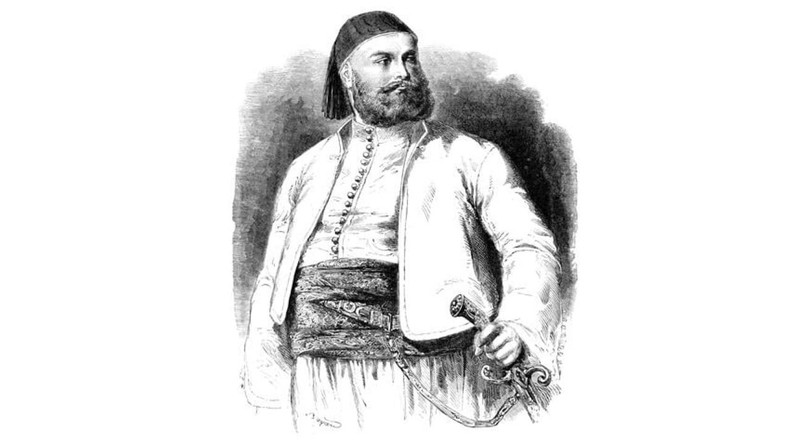Mohamed Sa'id Pasha (Arabic: محمد سعيد باشا) served as the Wāli of Egypt and Sudan from 1854 until 1863. He officially owed fealty to the Ottoman Sultan but in practice exercised virtual independence. The construction of the Suez Canal began during his tenure.
Life
He was the fourth son of Muhammad Ali Pasha. Ali Pasha wanted his son to have an athletic body and ordered him to exercise daily for two hours and follow a simple diet to get rid of his obesity. To safeguard the child's morals, he could visit no other house than that of Mathieu de Lesseps, the French consul. The young prince became friends with Mathieu's son, Ferdinand, and both of them enjoyed eating immense quantities of spaghetti. This intimacy and his longing for pasta caused Muhammad Said to hurry to the French consulate whenever the frugal diet of the viceregal table left a void in his stomach.
Later, the young Egyptian was sent to Paris to complete his education, where he again frequented the Lesseps' household.
Under Sa'id's rule, several law, land, and tax reforms were implemented. Some modernization of Egyptian and Sudanese infrastructure occurred using Western loans. In 1854, the first act of concession of land for the Suez Canal was granted to a French businessman, his old friend Ferdinand de Lesseps. The British opposed a Frenchman building the canal and persuaded the Ottoman Empire to deny its permission for two years. Sa'id signed the concession to build a canal on January 5, 1856.
An 1886 study described Sa'id as "sociable, witty, extravagant, sensual, and fond of all the delights of life, he seemed rather the gay French courtier than the imperturbable Moslem ruler. He set up a court not unlike that of Louis XIV. He welcomed foreigners and entertained them most lavishly. He forgot the sobriety enjoined by the Prophet so that his dinners and his wines became famed for their richness and excellence."
Sudan had been conquered by his father in 1821 and incorporated into his Egyptian realm, mainly to seize slaves for his army. Slave raids (the annual 'razzia') also ventured beyond Sudan into Kordofan and Ethiopia. Facing European pressure to abolish official Egyptian slave raids in the Sudan, Sa'id issued a decree banning raids. Freelance slave traders ignored his decree.
When the American Civil War brought a cotton famine, the export of Egyptian cotton surged during Sa'id's rule to become the main source of European mills. At the behest of Napoleon III in 1863, Sa'id dispatched part of a Sudanese battalion as part of the Imperialist coalition in support of the Second Mexican Empire during the Second French intervention in Mexico.
Under Sa'id's rule, the influence of sheikhs was curbed, and many Bedouins reverted to nomadic raiding.
In 1854, he established the Bank of Egypt. In the same year, Egypt's first standard gauge railway was opened, between Kafr el-Zayyat on the Rosetta branch of the Nile and Alexandria. In addition, he founded the Medjidieh, a precursor to the Khedivial Mail Line.
Sa'id's heir presumptive, Ahmad Rifaat, drowned in 1858 at Kafr el-Zayyat when a railway train on which he was travelling fell off a car float into the Nile. Therefore, when Sa'id died in January 1863, he was succeeded by his nephew Ismail.
The Mediterranean port of Port Said is named after him. He married twice, to a first wife, Inji Hanim, with one son, Ahmed Sherif Pasha, and to a second wife, Melekber Hanim, with two sons, Mahmoud Bey, and Mohamed Toussoun Pasha. He was buried in Hosh al-Basha, the Royal Mausoleum of Imam al-Shafi'i, Cairo, Egypt.
